#masters of the air book
Text

"At Sagan, two of the most powerful men in the prisoner hierarchy were Gale Cleven and John Egan from the Bloody Hundredth."
#masters of the air#peoples princess#callum turner#austin butler#mota#apple tv#mastersoftheair#john egan#bucky egan#buck cleven#gale cleven#donald l. miller#masters of the air book
192 notes
·
View notes
Text

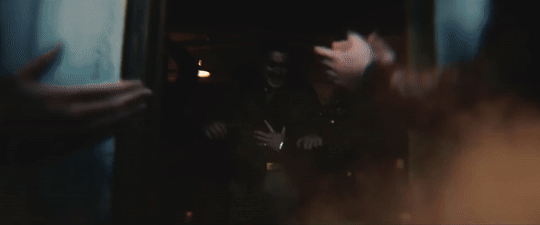
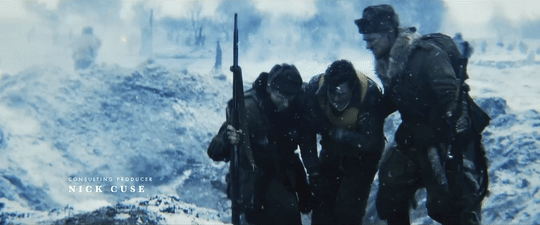

Nate Mann as Major Robert "Rosie" Rosenthal in the opening title sequence for Masters of the Air (2024) on Apple TV+
Coming January 26th!

#the scene with the russians in the book was so good and orloff better have put what rosie said in the show!!!#masters of the air#hbo war#robert rosenthal#major robert rosie rosenthal#major robert rosenthal#road to masters of the air#rosie rosenthal#rosie#rosie's riveters#masters of the air book#masters of the air show#masters of the air apple tv+#apple tv#hbowar#hbowaredit#hbo war edit#madsedits#nate mann
61 notes
·
View notes
Text
TIL they used “sleep therapy” to help aviators get over their “mental symptoms” that prevented them from flying effectively, nowadays diagnosed as depression, anxiety, and/or PTSD. They would put them into comas in which they slept for as long as 72 hours to make it easier to come to terms with events that just recently happened by distancing themselves chronologically. For most, accompanied by a follow-up “sympathetic talk treatment” was enough to “cure” their symptoms.
Additionally, they might be given a drug known as a “truth serum” that induces semi-consciousness where doctors can poke and provoke patients in order to get him to relive the traumatic experience. The hope was the aviators would be able to overcome their fears and trauma by confronting them.
These treatments were both discontinued later in the war when they were found to be ineffective.
Now I’m wondering if Crosby was actually asleep or if they drugged him??
#did they drug Croz??????#wtf#like wt actual f#real mota#SOURCE: Masters of the Air by Donald L. Miller#this is messed up#masters of the air#mota#history#wwii#mental health#Harry Crosby#masters of the air book
45 notes
·
View notes
Text





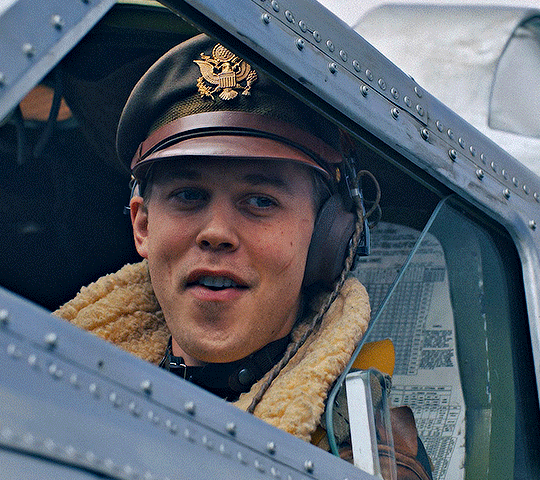

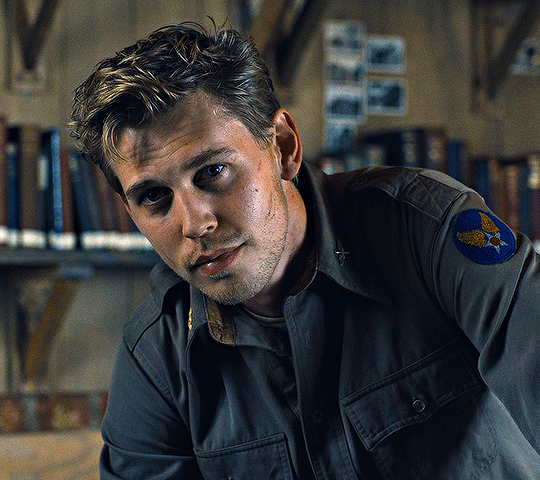
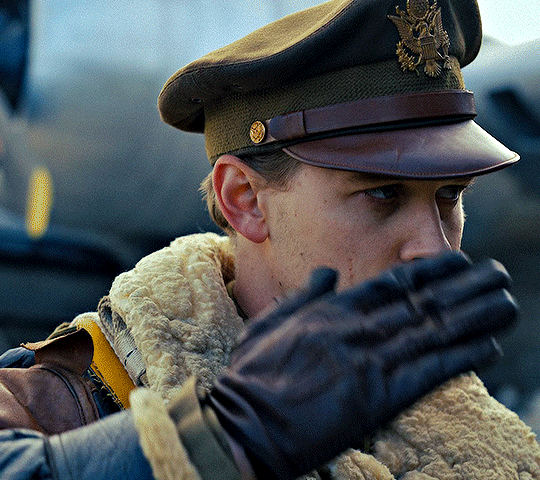

Masters of the Air: America's Bomber Boys Who Fought the War Against Nazi Germany
Donald L. Miller
#motaedit#mota#masters of the air#hbowardaily#hbowaredit#perioddramaedit#perioddramasource#appletvgifs#appletvsource#tvedit#tvgifs#austin butler#gale cleven#userbells#violaobanion#ronsparky#simizone#olympain#userstaud#*#so i finally have the book#and i come across this line right?#and it hooks into my brain until i can literally think of nothing else#extravagantly alive#like
1K notes
·
View notes
Text
Yep that’s me 👀

#netflix#imagine#oneshot#the walking dead#fypシ#shadow and bone#x reader#the originals#master of the air imagine#vampire diaries#teen wolf#house of the dragon#book tumblr#booktok#f1 imagine#spoiler
189 notes
·
View notes
Text



oh my heart. i can't do this anymore </3
#tonight has been. SO MUCH#i need to get my hands on a physical copy of this book idc#all the layouts are SO STUNNING and the pictures ughgh#(i'm being so normal)#i'm literally dizzy#i miss them so bad i can't believe it's almost been two months since it all ended :(#masters of the air#buckbucky
150 notes
·
View notes
Text
This excerpt from Masters of the Air lives in my brain rent free by the way:
With the war over, [Rosenthal] was still not through.
Back home in Brooklyn, working for his old Manhattan law firm, he found himself in an unsettled state.
“Throughout my war service, I had been tightly disciplined. I put the brake on my emotions and probably held too much inside me. Now I began to unravel. I couldn’t concentrate, I couldn’t focus on my work. We were working on some important law cases but the work seemed humdrum compared to what I had just been through.”
Rosenthal had been closely following the news of the Nuremberg war crimes tribunal, which had convened in November 1945, and felt he ought to be there.
[…]
[Rosenthal’s] job was to investigate the racial crimes committed by those who served under Göring, Joel, and Keitel.
“I interrogated all three of them. Göring was arrogant and unrepentant, but the army generals talked to me in a grandfatherly way, claiming they had nothing to do with the Nazi atrocities. Keitel was especially insistent that he had adhered to the German military’s code of honor. They lied, of course.”
“Seeing these strutting conquerors after they were sentenced - powerless, pathetic, and preparing for the hangman - was the closure I needed. Justice had overtaken evil. My war was over."
#i feel like it fits nate mann's portrayal of rosie PERFECTLY#only been able to move on my seeing through to the end - seeing these horrific men sentences#also this excerpt is at the very end of the book. the emotional devastation to end on 'justice had overtaken evil. my war was over'#rosie rosenthal no one is doing it like you are#character of all time.#everyone say thank you nate mann#rosie mota#rosie rosenthal#robert rosenthal#masters of the air rosie#ch: rosie#tv: masters of the air#masters of the air#jack talks
87 notes
·
View notes
Text
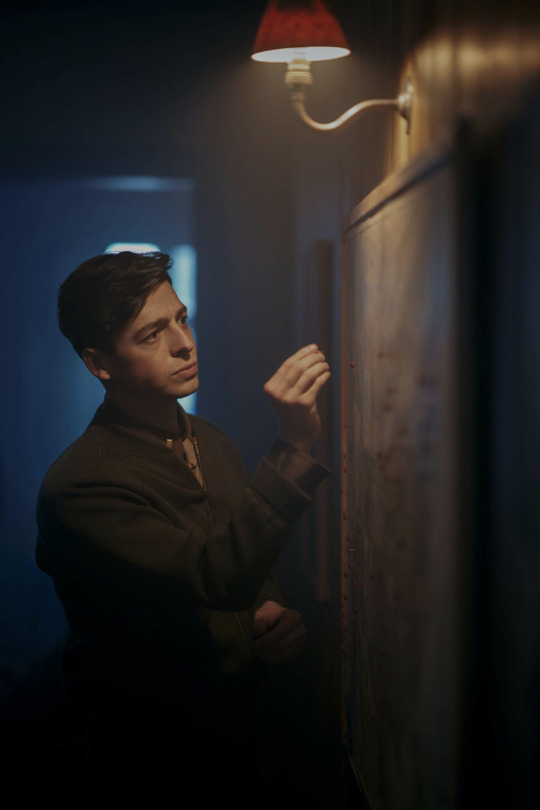
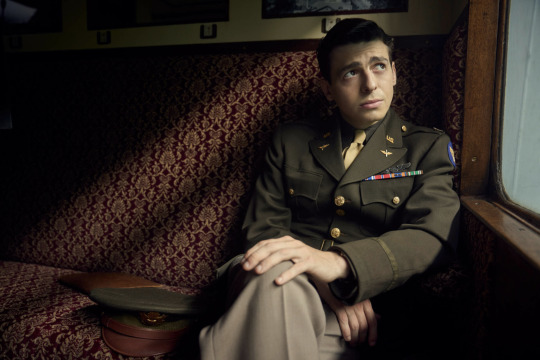
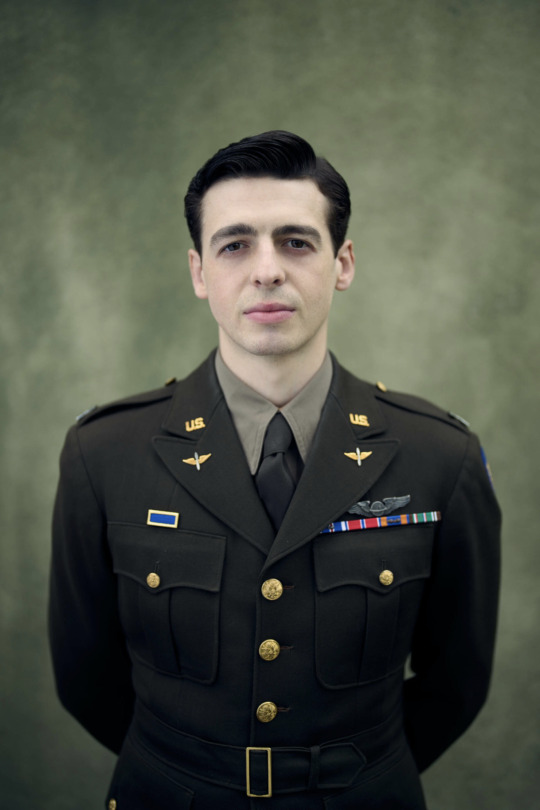


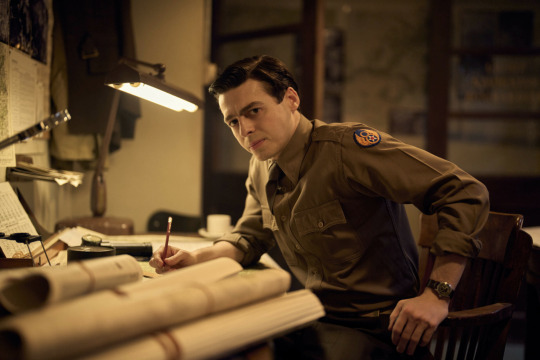
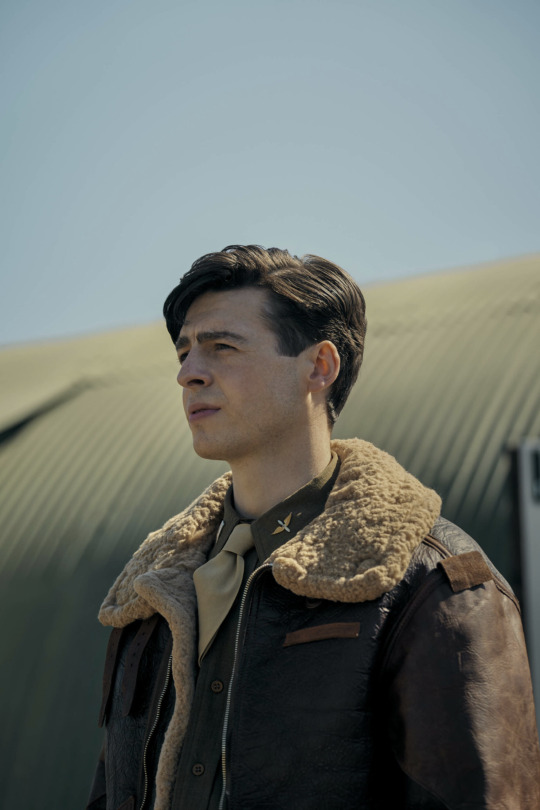

Anthony Boyle as Harry H. Crosby in Masters of the Air
Photos by Robert Viglasky
#masters of the air#anthony boyle#harry crosby#also feat#jack kidd#rosie rosenthal#chick harding#mota#ok some other pics of my other beloved and now I’m done#what I wouldn’t give for like. a big glossy photo book of all these pics#apple tv listen to me!!!!#my post
147 notes
·
View notes
Text
Band Of Brothers and Masters Of The Air and The Pacific fans:
What are the books I need to read?
I got MOTA so I need which other ones?
Please and thank you!
50 notes
·
View notes
Text

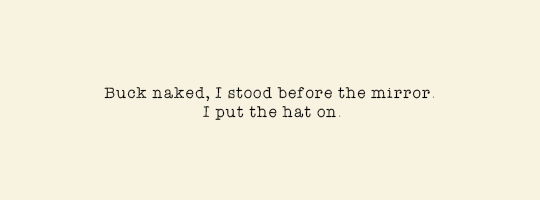
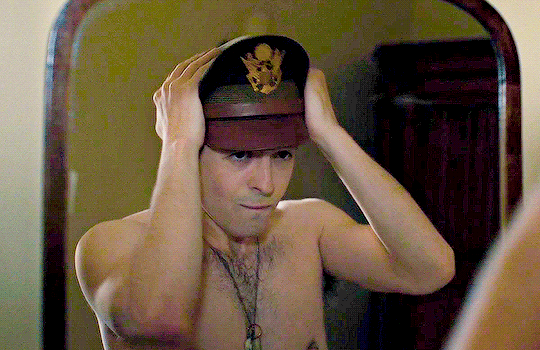
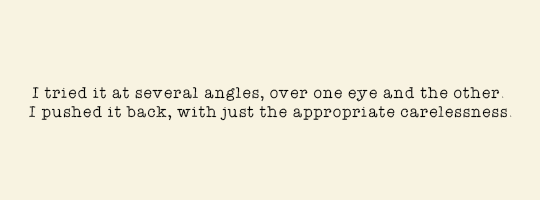
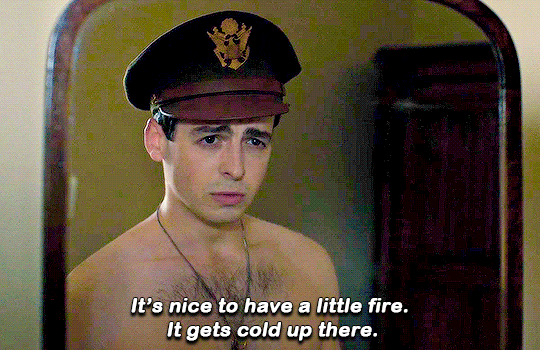
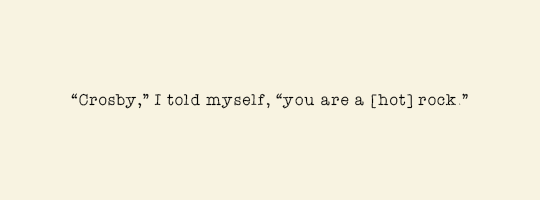
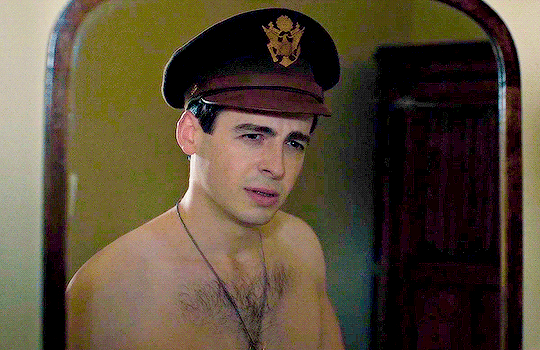
Masters of the Air vs real life counterparts
(source: A wing and A prayer by Harry H. Crosby)
#adding to the list of things I cant believe croz wrote down in a book 50 years later#and actually made it onto the show 80 years later#iconic#mota#motaedit#ronsparky#masters of the air#anthony boyle#harry crosby#hbo war#appletvsource#appletvgifs#motagifs#damn liz back at it again with those gifs#hbowardaily
146 notes
·
View notes
Text

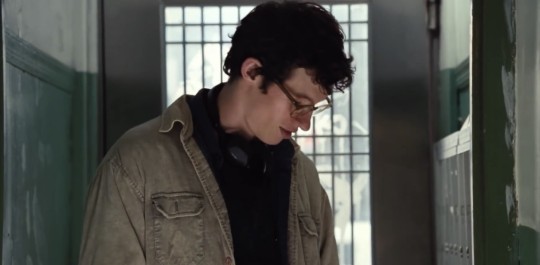
More Modern Reincarnation AU thoughts
"So what brought you to town?" Buck asks.
"Ah," Bucky stares down at his coffee. The ice has already started melting in the late summer heat. He fiddles with it, swirling it around. "It's a bit complicated."
"How so?" Buck leans in.
"A bit too complicated for a first meeting," Bucky says with a sad smile. "I don't wanna scare you off when I just met you now do I Buck?"
"Well, I don't scare so easy." Buck reaches out placing a hand on Bucky's own. "But I won't force you."
"Thanks," Bucky squeezes Buck's. "But, that doesn't mean we can't talk about you."
"Ha," Buck breathes out a laugh. He still hasn't pulled his hand away. "I see how it is. Dodge the question, so you can repeat it. You turned the tables on me real quick."
"Just curious," Bucky laughed. Buck stared at him wide-eyed. "Don't get a lot of boys telling me I look like an old friend from Wisconsin, and I'm curious about the one who did."
"Well," Buck draws out the word. He still hasn't taken his eyes off of Bucky, and it's hard work fighting a blush with those blue eyes taking in his every feature. "I'm a student at Georgetown. Trying for my PhD."
"Wow," Bucky pushes his glasses up. "In what?"
"Interplanetary physics." Buck says it with a smile. "Bit nerdy, right?"
"Not at all!" Bucky leans in affronted that someone would dare say that. "Who told you that? They're just jealous."
✨️
"I don't know why I'm telling you all this," Bucky laughs. Shakes his head and starts to pace because he really can't explain it, and it drives him up the wall. "There's just something different about you? I think."
Bucky pauses, shakes his head again as if that'll clear his head. Buck hasn't stopped staring at him.
"You're something else, Buck." Bucky stops pacing to just stare right back at Buck. He doesn't do that very often, stare back at Buck. When he does, a weight presses down, down, down on his chest until he can scarcely breathe. Buck never looks away, but Bucky always has to.
✨️
"Why do you go by the name Egan?" Buck asks him one day while they're slaving over textbooks and assignments in another coffee shop. Bucky found this one online a week ago. The lemon tarts are divine, but the coffee is so so. Though that may be because he chose a lavender oat milk latte instead of his usual caramel macchiato. Sue him, the sign next to the tarts had said they paired well together.
Bucky shrugs, not lifting his eyes from his reading. Buck has to tap him on the nose to get a better answer.
"Easier, I guess." Bucky pushes up his glasses with one finger. Buck still stares at him as if every motion or movement is brand new, like he's one of the stars Buck adores so much. Bucky still can't stare back for too long. "No one expects someone with my family name to change it, so I can fly under the radar. Live my life without the burden of all those eyes."
I have SO MANY thoughts about this AU! Someone please take them out of my head, I need to focus on England Arc for my a/b/o fic series!
#mota#masters of the air#buck x bucky#john bucky egan#clegan#gale buck cleven#mota au#mota fic#mota reincaration au#bucky egan#buck cleven#bucky is a big bundle of secrets and trauma in this au and buck would listen to every secret with stars in his eyes still#also bucky is a history major because i think he' be cute with his classes carrying around old books and writing obscure essays#plus he'd be like the weird darling of the department because he is so obssessed with ww2 but not in the gross way most men are#i was a history major so i dealt with so many gross ww2 buffs meanwhile bucky would be the idealized history boy with his glasses and curls#i just think we as a fandom need to write more pining buck#buck who is head over heels for his sunshine boi bucky#modern reincarnation au
81 notes
·
View notes
Text
Dulag Luft
Places of Interest in Masters of the Air
Masterlist
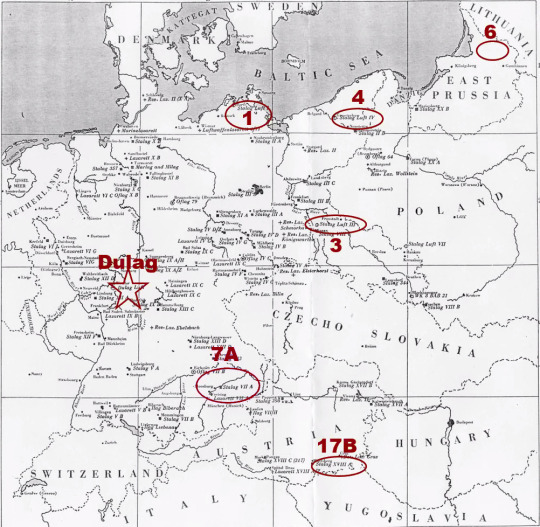
When captured by the Germans, Allied airmen would be sent to Dulag Luft, the interrogation and transit POW camp for the Luftwaffe that was just northeast of the city of Frankfurt. This is the camp where Cleven and Egan were held in solitary confinement for weeks before being transported right outside Sagan to Stalag Luft III.
Dulag Luft interrogators were some of the best in the business, and Miller describes them in Masters of the Air as "deeply skilled specialists who preferred methods more subtle than a rubber hose (Miller, 2007, pg. 386)." Many of these interrogators had spent time in America and were fluent in English. The conversation "would begin by offering him chocolate and cigarettes and then draw him into some light banter about American baseball or movies.... [the conversation] became so congenial that many airmen were unaware that the interrogation had begun (Miller, 2007, pg. 386)."
The interrogators had thick folders on each man and their bomb group. They gathered their information from intercepted communications, Stars and Stripes newspaper articles, and anything else they could get their hands on. It unnerved some of the men that the Germans knew such specific details of themselves, their families, and their bombardment groups. The conditions were terrible, and many of the officers were subjected to solitary confinement for weeks at a time.

Miller writes about this in his book:
“Downed Allied airmen felt safer in the hands of the German military than they did with the local citizenry they had bombed. Luftwaffe police and interrogators were in official charge of captured airmen, and their tactics for extracting information were rough but rarely barbaric. After being captured, Lou Loevsky was shipped with other downed American airmen to Dulag Luft, the Luftwaffe interrogation center for Allied airmen at Oberursel, a suburb of Frankfurt am Main.
At one point in his interrogation a smiling Luftwaffe major asked Roger Burwell why the men in his 381st Bomb Group at Ridgewell had not yet fixed the broken clock in their officers club. Airmen who refused to provide military or personal information were usually threatened verbally. Some were told that their families would not be informed they were alive and "safe" until they began to cooperate; men captured without identification tags were warned that they could be turned over to the Gestapo to be executed as spies. One stubbornly tight-lipped officer - married and with children - was told that if he persisted in his obstinacy, a report would go out the next day from the German radio station in Calais that the night before he was shot down he had been at the Grosvenor House in London, in room 413, with an attractive blond woman. Knowing that the information was exactly correct, the major is reported to have fainted on the spot.
Prisoners were also softened up by the appalling conditions at Dulag Luft: the tomblike isolation, the starvation rations, and the mice that ran free in the dank cells, and crawled in prisoners' pockets searching for food. Sometimes the promise of a shower, a shave, and a hot meal was sufficient to loosen a man's tongue. The guards also fiendishly manipulated the temperatures in the cells, shutting off the electric wall heaters in the winter and turning them up to intolerable levels, to 130 degrees, in warmer weather. Hundreds of airmen arrived at Dulag Luft wounded and were denied medical treatment, a flagrant violation of the Geneva Conventions regarding prisoners of war. "My interrogator said he could see that I was injured and needed treatment and that my being stubborn would only delay my being sent to a hospital," Roger Burwell re-called. On the other hand, high-ranking Allied fliers believed to possess specialized military information were taken on hunting trips or invited to raucous drinking parties with German officers.
Most of the information was gathered from Allied sources by Dulag Luft's efficient staff, who scrutinized American magazines and newspapers brought in from neutral Portu-gal, including Stars and Stripes, a rich source of hometown information about airmen. Additional information, including logbooks, briefing notes, and airmen's personal diaries, was gathered from clothing and other personal belongings found in the charred wreckage of bombers. These documents often contained highly secret data about flight patterns, the effectiveness of German defenses, and targets marked for future bombing.
An officer in the American Air Force's Counter Intelligence Corps noted at the time that 'it was not uncommon for large German manufacturers to ask the Luftwaffe if their factories were on the list, and if so, when they could expect to be bombed." German linguists also monitored Allied airmen's wireless communications. According to Hanns Scharff, the interrogators at Dulag Luft had at their disposal a copious file in which "nearly every single word spoken in the air from plane to plane or from base to plane or vice-versa was carefully noted." As Air Force counter-intelligence experts noted in their own secret files, "nothing in the way of documents, written or printed, was too insignificant to merit close scrutiny" by the intelligence staff at Dulag Luft.
A case in point is the airmen's ration cards. Every American flier in the European Theater received exactly the same kind of card, and there was nothing on the card to indicate where he was stationed. But investigators at Dulag Luft were able to identify an airman's bomb group by the way his card was canceled. At Thorpe Abbotts, for example, the clerks on duty in the PX marked the cards with a heavy black pencil. The PX counter was made of rough board. All the cards canceled there carried the impression of its distinctive pattern in the black pencil markings. The Air Force's Counter Intelligence Corps estimated that 80 percent of the information obtained by Dulag Luft was supplied by captured documents and monitored radio traffic, with the remainder coming from POW interrogations.
After the war, when he was hired as an interpreter by the American military, Hanns Scharff estimated that all but twenty of the more than 500 airmen he questioned disclosed operational and tactical information that proved useful to the Luftwaffe. Few of these airmen, he emphasized, did it knowingly, or through intimidation or a conscious desire to improve the conditions of their confinement. "I suppose he got something out of me," said one flier, "but to this day I haven't the least idea what it could have been."
After being released from Dulag Luft, Loevsky and several dozen other airmen were taken by tram to Frankfurt, where they were herded onto cattle cars and sent deep into German-occupied territory to Stalag Luft III (Air Camp number three), near the town of Sagan, a hundred miles southeast of Berlin, one of the half-dozen main POW camps operated by the Luftwaffe hence the term "Luft," or air-for Allied airmen (Miller, 2007, pg. 387-89)."
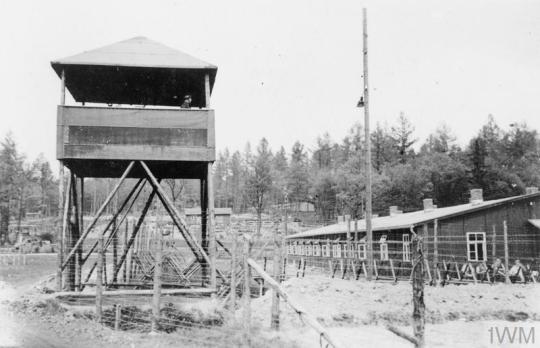
Dulag Luft was the first stop in a sequence of camps and transportation depots that downed airmen had to go through. Hopefully, we'll get to see more of the camp in the show! We're less than a month away, guys! The wait is almost over!!

tag list: @ronald-speirs @footprintsinthesxnd @georgieluz @sweetxvanixlla @coco-bean-1218 @gloryofwinter
message or comment if you want to be added to the tag list! <3

#gale cleven#john egan#masters of the air#gale buck cleven#hbo war#major buck cleven#major john egan#rosie rosenthal#1940s#8th air force#stalag iii#stalag luft iii#dulag luft#pow#100th bomb group#eighth air force#about masters of the air#road to masters of the air#donald miller#masters of the air book
34 notes
·
View notes
Text
If you have Spotify Premium, you have access to the Masters of the Air audiobook!!!
I will be giving it a listen while at work because obviously engineering airplanes isn’t enough :)

24 notes
·
View notes
Text
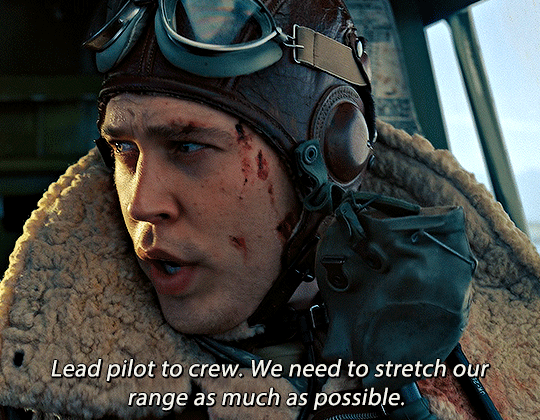

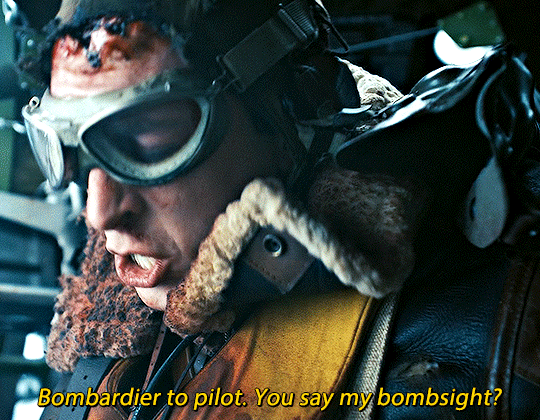
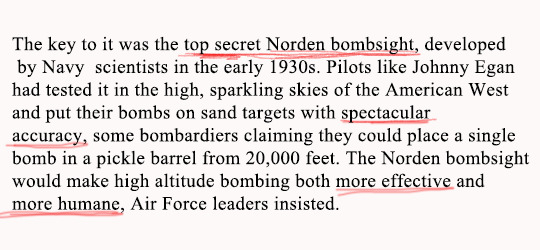
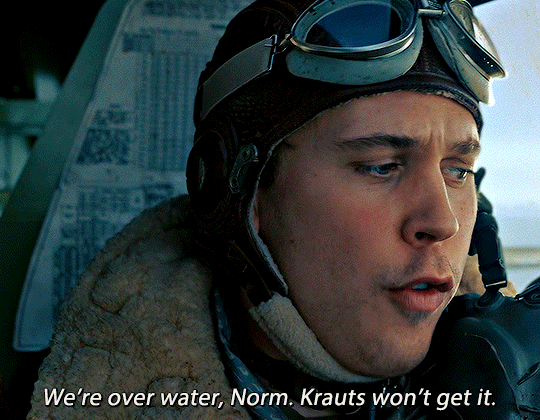


The Eighth Air Force was the proving instrument of "pickle-barrel bombing."
Masters of the Air: America’s Bomber Boys Who Fought the War Against Nazi Germany
Donald L. Miller
#motaedit#mota#masters of the air#tvedit#tvgifs#gale cleven#austin butler#perioddramaedit#perioddramasource#appletvsource#hbowardaily#hbowaredit#blood cw#userbells#ronsparky#simizone#violaobanion#olympain#*#one thing about me#is i will be losing my mind about this series and the book
170 notes
·
View notes
Text
100th Bomber Boys: Major John 'Bucky' Egan
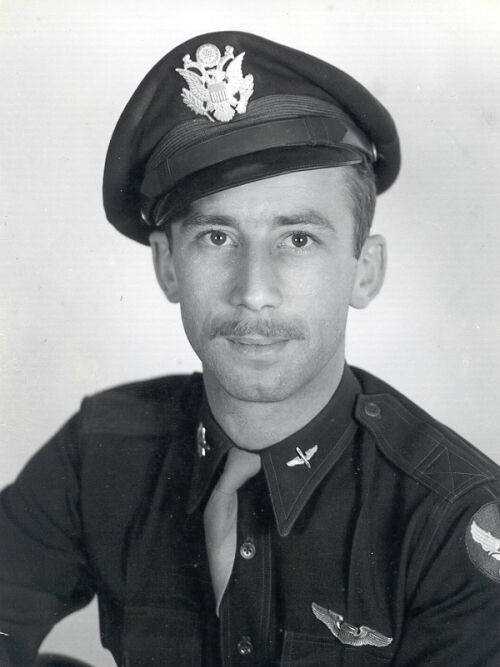
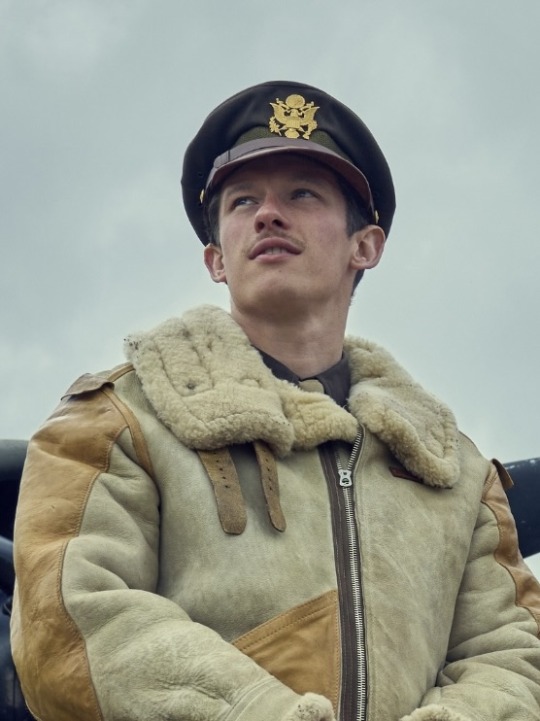

Here is a little bit about Major John 'Bucky' Egan (played by Callum Turner) from the prologue of Masters of the Air by Donald L. Miller (pg. 3, 7-8)!
John Egan was commander of a squadron of B-17 Flying Fortresses, one of the most fearsome killing machines in the world at that time. He was a bomber boy; destruction was his occupation. And like most other bomber crewmen, he went about his work without a quiver of conscience, convinced he was fighting for a noble cause. He also killed in order not to be killed.
Egan had been flying combat missions for five months in the most dangerous air theater of the war, the "Big Leagues," the men called it; and this was his first extended leave from the fight although it hardly felt like a reprieve. That night, the German air force, the Luftwaffe, plastered the city, setting off fires all around his hotel. It was his first time under the bombs and he found it impossible to sleep, with the screaming sirens and the thundering concussions.
Egan was attached to the Eighth Air Force, a bomber command formed at Savannah Army Air Base in Georgia in the month after Pearl Harbor to deliver America's first blow against the Nazi homeland. From its unpromising beginnings, it was fast becoming one of the greatest striking forces in history. Egan had arrived in England in the spring of 1943, a year after the first men and machines of the Eighth had begun occupying bases handed over to them by the RAF-the Royal Air Force-whose bombers had been hammering German cities since 1940. Each numbered Bombardment Group (BG)-his was the 100th-was made up of four squadrons of eight to twelve four-engine bombers, called "heavies," and occupied its own air station, either in East Anglia or the Midlands, directly north of London, around the town of Bedford.
pg. 7-8
As commander of the Hundredth's 418th Squadron, Johnny Egan flew with his men on all the tough missions. When his boys went into danger, he wanted to face it with them. "Anyone who flies operationally is crazy," Egan confided to Sgt. Saul Levitt, a radioman in his squadron who was later injured in a base accident and transferred to the staff of Yank magazine, an army publication. "And then," says Levitt, "he proceeded to be crazy and fly operationally. And no milk runs..."
When his "boy-men," as Egan called them, went down in flaming planes, he wrote home to their wives and mothers. "These were not file letters," Levitt remembered. "It was the Major's idea they should be written in long-hand to indicate a personal touch, and there are no copies of these letters. He never said anything much about that. The letters were between him and the families involved."
Major Egan was short and skinny as a stick, barely 140 pounds, with thick black hair, combed into a pompadour, black eyes, and a pencil-thin mustache. His trademarks were a white fleece-lined flying jacket and an idiomatic manner of speaking, a street-wise style borrowed from writer Damon Runyon. At twenty-seven, he was one of the "ancients" of the outfit, but "I can out-drink any of you children,'" he would tease the fresh-faced members of his squadron.
On nights that he wasn't scheduled to fly the next day, he would jump into a jeep and head for his "local," where he'd gather at the bar with a gang of Irish laborers and sing ballads until the taps ran dry or the tired publican tossed them out."
In Master's of the Air, Major John Egan is sometimes called, "Bucky," "Honest John," and "Johnny." The men of his squadrons loved his leadership style, which was leading by example, as seen in the excerpt above.
John Archer, a long-time British friend of the 100th & its veterans, described Egan in his story, One Man and His Dog:
"The Major was a lean, dark young man with a wisp of moustache. He was 27, but looked older. He could turn on the charm and turn it off whenever he liked. It’s the kind of thing one experiences in foreman of construction gangs and traffic managers at airports, in jobs where contact and participation with the men is the prime factor."
Major Egan was involved in the case of “Meatball vs the Pullet” a few days before he went down on a raid over Germany. Now Meatball was a half-grown husky dog which the crew of the B-17 brought over from Labrador on their way to Thorpe Abbotts during the summer of 1943. It seemed that Meatball was a bad dog, and all of a sudden turned into a chicken killer. And when did he decide to become a chicken killer? At a time when the personnel were involved in the toughest flying missions the group had yet undertaken. Deep raids as far as Danzig against desperate opposition.
And in this tense atmosphere Meatball got playful one morning and mangled a chicken dead. The nearby farmer went bustling up to the orderly room to see the Major. Major Egan was sitting in with his pilots having an informal briefing with the men about new tactics in aerial combat. It was the afternoon following a raid on Emden, October 3, 1943.
The farmer from down the road described “a light brown dog” that had killed a pullet.
“Light brown. That’s Meatball, all right,” said the Major. “And you say he got a pullet?” asked the Major sympathetically. “Well, a pullet is pretty important, isn’t it?”
“It is,” said the farmer, calming down by this time.
Where did you ever hear of a Major who knew anything about pullets, and what is more, who would talk about loss sympathetically in the middle of a grim military operation? Clearly the Major was now pulling out the charm act. He could, of course, have turned the whole matter of Meatball, pullet and payment over to the Adjutant. But the affair seemed right down the Major’s alley. All the new crews who had just arrived at Thorpe Abbotts were by that time listening with amazement.
“That pullet, did she look like a layer?” asked the Major. You could see by his face that he was rather tired, after all, it was only an hour or so since the raid was over.
“She did, Sir, for a fact,” said the farmer.
“Well, what would you say she’s worth?” asked the Major.
“Twenty bob,” said the farmer.
“All right,” said the Major. “I think that’s a pretty reasonable sum for a good pullet, don’t you?” he inquired looking around at the crews who flew the big bombers. They looked at him quite dumbfounded, not quite figuring it out, and wondering who was pulling whose leg. And the Major was aware he had everyone right there in front of him. He was the actor and the rest were the audience. The farmer had departed by this time, very pleased, and the Major was rocking back and forth on his chair and looking around. And from the subject of the Germans using rockets and guns, the conversation was not on pullets.
One of the young officers piped up and remarked, “A pullet, isn’t that some kind of… a rooster… like…” The Major glared at him and the officer’s face grew red. By now the class was sitting quite quietly.
“A pullet,” said the Major patiently, “is a half-grown female chicken which lays a small egg with a very small yolk.” And he showed them just how big with his fingers. “Then,” continued the Major, “the machinery inside the pullet goes to work and all of a sudden – one fine day it lays an egg twice as big as the usual and it is no longer a pullet.” The briefing closed at that point.
A few days later, Major Egan said goodbye for the last time to Meatball before climbing into his B-17. On October 10th, during a raid on Munster, the Major became a guest of the German forces, spending the rest of the war in a prison camp.
There was a certain pub in Dickleburgh that missed Major Egan. Sometimes he drove down in a jeep and sang songs in the bar with the locals and Irish laborers. With the affair of Meatball and the pullet, and the grim task of flying missions, Major Egan rounds out into a real example of an American who once walked the lonely lanes at Thorpe Abbotts.
Egan served as Air Exec for the 100th, as Commander of the 418th Squadron, and on the Munster raid flew as Command Pilot on John Brady’s lead crew. After being shot down, all but one of Brady’s crew survived as POWs.
(you can find more about this story here)
Egan was best friends with fellow 100th Bomb Group squadron commander, Maj. Gale "Buck" Cleven, whom he went to flight school with back in the States. The pair were roommates back in training, and little did they know they'd be roommates once again when they became German POWs in October of 1943. Buck after getting shot down over Bremen, and Egan in a retaliatory raid to get back at the Germans after they shot down his friend.
Egan was leaving for his first leave to London from Thorpe-Abbotts on October 8th when Buck Cleven and the rest of the 13th Combat Wing took off for Bremen. The next morning over breakfast, Egan saw the London Times headline: Eighth Air Force Loses 30 Fortresses Over Bremen," and sprang out of his chair to a phone. Due to wartime security, he had to speak in code.
Masters of the Air, pg. 10:
"How did the game go," he asked.
Cleven had gone down swinging, he was told.
Silence.
Pulling himself together, Egan asked, "Does the team have a game scheduled for tomorrow?"
"Yes," came the reply.
"I want to pitch."
He was back at Thorpe Abbotts that afternoon in time to "sweat out" a long mission the group flew to Marienburg, a combat strike led by the Hundredth's Commander, Col. Neil B. "Chick" Harding, a former West Point football hero. As soon as the squadrons returned, Egan got Harding's permission to lead the Hundredth's formation on the next day's mission.
This mission was set for Münster, just southwest of Bremen where Buck was shot down. Egan flew with Captain John D. Brady on the M’lle Zig Zig to Münster, and the heavy, along with all other planes but Royal Flush (Rosenthal's replacement B-17) in the 100th went down over the target. The crew of the M'lle Zig Zig bailed, parachuting through the flack-filled air. Hambone Hamilton was among the 'Zig's crew, and suffered multiple wounds from shrapnel. When found by Germans, he was taken to the hospital and stayed there recovering for a good while.
Egan, unlike the rest of the 'Zig's crew, was able to evade capture a few days before finally being taken prisoner. The aviators were first sent to Dulag Luft, the Luftwaffe's POW transit center. Egan and the other officers were kept separate from their men in cold and flea-infested solitary cells. Egan and Cleven were just a few cells apart, but neither knew the other was there. After a few weeks, Cleven and the men who were brought in with him were sent to Stalag Luft III, another POW camp just outside the town of Sagan, some 300 miles from their previous location. They were transported by train cars used for livestock, and they reported that "the smell of manure was overwhelming (Miller, 2007, pg. 23)." The trip took them three days. Three days after Cleven got to Stalag Luft III, Egan and his men arrived.
Masters of the Air, pg. 23:
Cleven watched them file into a neighboring stockade. Spotting Johnny Egan, he called out to him, "What the hell took you so long?"
"Well, that's what you get for being sentimental," Egan shouted back.
Both Egan and Cleven remained POWs until the end of the war. Cleven, however, managed to escape on a march in 1945. The pair remained good friends until John's death from a sudden heart attack in 1961. Egan served as Buck's best man in his wedding when he married his sweetheart Marge in 1945 once they returned home.
John married his own sweetheart, Lt Josephine "Doty" Pitz (WASP) in late 1945. They had two beautiful daughters together.

tag list: @lena-basilone @luckynumber4
let me know if you want to be added to the tag list!!
#masters of the air#this is for everyone who doesn't have access to the book but wants more info on the guys!!!#major john egan#100 bombardment group#bloody hundredth#major gale cleven#donald miller#mota#hbo war#hbowar#callum turner#austin butler
113 notes
·
View notes
Text
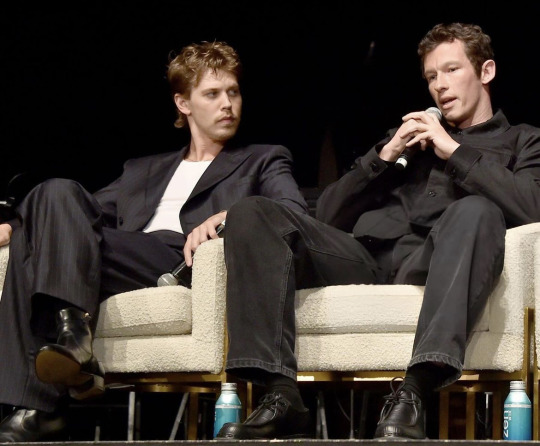
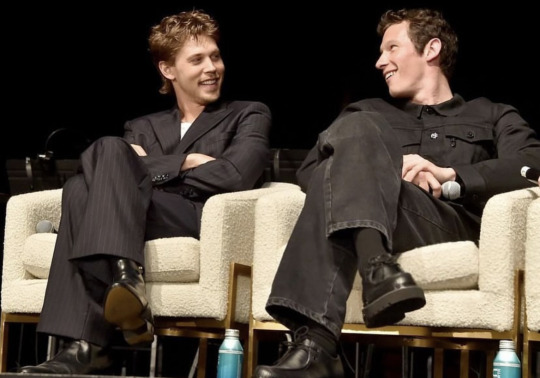


the boys <3 :'))
#i need to light up a joint so bad#genuinely fuck me dead i need to lay in the rain for the next three business days#my head literally hurts from how fast my heart's been going all evening i'll be so real#this is everything to me. may 4 2024 will go down in the history books for me xxx#gotta be normal in the post unhinged in the tags#masters of the air
55 notes
·
View notes